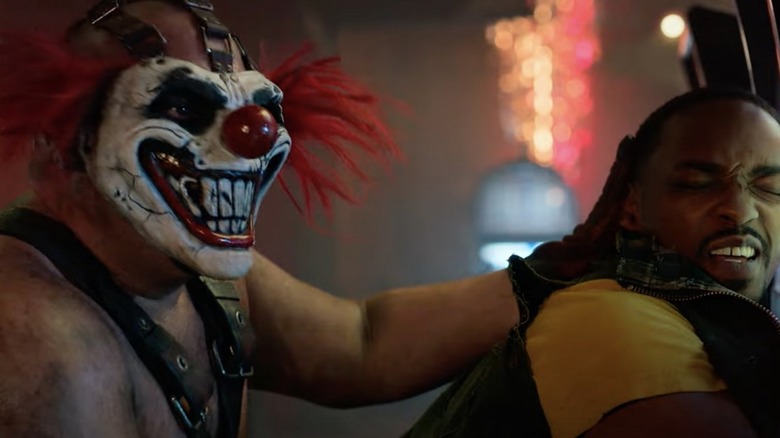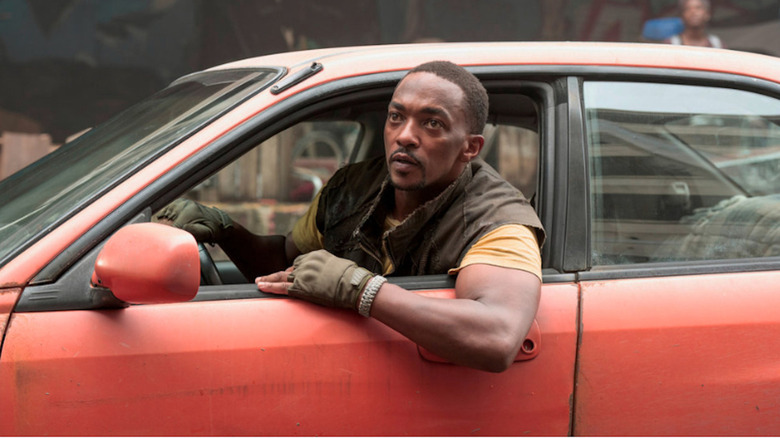Why Twisted Metal Is The Violent Heir To Mad Max & Death Race's 'Carsploitation'
Contains spoilers for "Twisted Metal" Season 1
Peacock's "Twisted Metal" is a gung-ho, action-packed series about an expert wheelman who must navigate a post-apocalyptic wasteland to complete a dangerous mission. It boasts an all-star cast that includes Anthony Mackie, Neve Campbell, Will Arnett, and Stephanie Beatriz. The series is going to resonate with the masses, but it also contains the hallmarks of a niche subgenre of entertainment known as carsploitation.
Carsploitation is a catch-all term for exploitation movies and TV shows that center around vehicles. The subgenre rose to prominence in the 1970s with movies such as "Vanishing Point," "Gone In 60 Seconds," "Death Race 2000," and "Mad Max." Carsploitation encompasses everything from action to horror to futuristic science fiction; however, the genre-spanning stories are unified by their love of life in the fast lane.
These days, authentic carsploitation releases are too few and far between. The "Fast & Furious" franchise is inspired by the subgenre, but it's too inoffensive and mainstream to be proper carsploitation. Quentin Tarantino's "Death Proof," Nicolas Winding Refn's "Drive," George Miller's "Mad Max: Fury Road," and Jeremy Rush's "Wheelman," are truer 21st-century examples, but how often are we treated to entertainment of this ilk?
Fortunately, "Twisted Metal" has arrived to fill the void, and it's one of the better carsploitation vehicles in quite some time. Furthermore, it's a worthy modern successor to the brand of thought-provoking mayhem depicted in "Mad Max" and "Death Race 2000."
Twisted Metal is thoughtful carsploitation
Entertainment that falls under the "carsploitation" umbrella is often dismissed as disreputable schlock. That couldn't be further from the truth, though, as the golden age of carsploitation cinema and television boasts plenty of titles that highlight the sociopolitical anxieties of society at the time. For example, "Death Race 2000" is a futuristic satire that takes aim at violent entertainment, sports, and politics. "Mad Max," meanwhile is a post-apocalyptic cautionary tale that set out to warn us about hurting the environment and the finite nature of the planet's natural resources.
"Twisted Metal" is concerned with similar ideas. While its central story about a dangerous road trip through lawless post-apocalyptic lands is a typical storyline in carsploitation fare, the series also addresses contemporary real-world issues. The story is essentially about someone who must risk his life for rich people before he can live in regular society, which is a prime example of a common worker being exploited by the elites.
In Season 2, viewers can also look forward to a deadly tournament, similar to the bloodsport-as-entertainment concept depicted in "Death Race 2000." In "Twisted Metal" Episode 10, the powerful leader of New San Francisco, Raven (Neve Campbell), tells Doe that he needs to win the contest and bring her the grand prize — or else. "Twisted Metal" warns us of a future where regular folks will become obsolete and entertainment will lack a moral center. Furthermore, it's a doom-laden message that would make the show's carsploitation godfathers proud.

